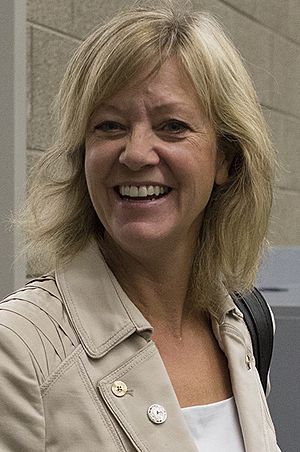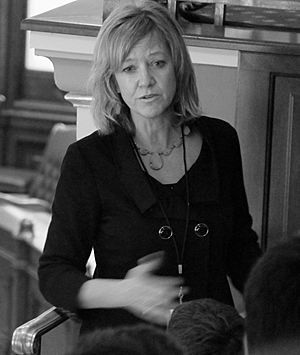Jeanne Ives facts for kids
Quick facts for kids
Jeanne Ives
|
|
|---|---|

Ives in 2015
|
|
| Member of the Illinois House of Representatives from the 42nd district |
|
| In office January 9, 2013 – January 9, 2019 |
|
| Preceded by | Sandra M. Pihos (redistricted) |
| Succeeded by | Amy Grant |
| Personal details | |
| Born |
Jeanne Remmes
October 4, 1964 Vermillion, South Dakota, U.S. |
| Political party | Republican |
| Spouse | Paul Ives |
| Education | United States Military Academy (BS) |
| Military service | |
| Branch/service | United States Army |
| Years of service | 1987–1993 |
Jeanne M. Ives (born October 4, 1964) is an American politician. She is a member of the Republican Party. She used to be a representative for the 42nd district in the Illinois House of Representatives.
Ives also ran for governor of Illinois. She also ran to be a U.S. representative for Illinois's 6th congressional district. She served three terms in the Illinois House, from 2013 to 2018. In 2018, she ran for governor but lost to the person who was already governor, Bruce Rauner.
In 2020, Ives ran for the U.S. House in Illinois. She won the Republican primary election. However, she lost the main election to the current representative, Sean Casten. As of November 2022, Jeanne Ives is part of the Illinois Republican State Central Committee. She represents Republicans in Illinois's 3rd congressional district.
Contents
Early Life and Career
Jeanne Ives is the third of six children. She finished high school in Vermillion, South Dakota, in 1983. She then went to the United States Military Academy. After graduating, she served as an officer in the United States Army. Later, Ives also served on the city council for Wheaton.
Serving in the Illinois House of Representatives
Jeanne Ives was elected to the Illinois House of Representatives in 2012. She worked to stop laws she thought were not good for the state. By 2017, five of her 134 proposed laws had become official laws.
Views on Healthcare Funding
Ives decided to run for governor in 2018 because she disagreed with Governor Bruce Rauner. He had signed a law called HB-40 in September 2017. This law made sure that certain healthcare services remained legal in Illinois. It also allowed state health insurance and Medicaid to help pay for these services.
Ideas for Education
When Ives ran for governor, she wanted to combine school districts in Illinois. She believed this would help save money. She noted that Florida has fewer school districts than Illinois, even though both states have similar populations.
In 2015, a college in Illinois, the College of DuPage, paid its president a large sum of money to leave early. Ives proposed a law (HB 3593) to stop this from happening again. Her law would limit how much colleges could pay departing presidents. It also set rules for how long contracts could be. This bill became law for community colleges. Later, a similar law was made for all colleges in Illinois.
Views on Immigration
Ives wanted to cancel Illinois' TRUST Act. This law was signed in August 2017. She said it created a "sanctuary state." However, fact-checkers said this was not true.
Views on LGBT Rights
In 2013, Ives shared her views on same-sex marriage. She believed marriage should only be between one man and one woman. When a law allowing gay marriage passed in Illinois, Ives said it did not protect religious freedom enough.
In 2014, Ives voted against banning a practice called gay conversion therapy. Illinois later banned this practice for young people in 2015. Ives also opposed a 2017 law that would make it easier for transgender people to change their birth certificates. She also did not support adoption by gay couples in Illinois.
Views on Drug Policy
..... She believed it led to more young people using it and more traffic accidents. She thought Illinois should not follow that path.
Views on Minimum Wage
In May 2017, Ives voted against a law (Senate Bill 81) that would have raised the minimum wage in Illinois. This law aimed to increase the minimum wage to $15 per hour by 2022.
Campaign for Governor in 2018
On October 28, 2017, Jeanne Ives announced she would run for governor of Illinois. She wanted to challenge the current governor, Bruce Rauner. Her running mate was Richard Morthland. Ives and Rauner agreed on many Republican ideas, like changing pension rules and lowering property taxes. Their main disagreements were on social issues.
In the Republican primary election on March 20, 2018, Rauner won against Ives. He received 51.5 percent of the votes, and Ives received 48.5 percent. Rauner then lost the general election to Democrat J.B. Pritzker.
Campaign for U.S. House in 2020
In July 2019, Ives announced she would run for the U.S. House in Illinois's 6th congressional district. She faced Jay Kinzler in the Republican primary. In March 2020, Ives won the Republican nomination. This meant she would run against the current Democratic representative, Sean Casten, in the general election.
In October 2020, it was reported that Ives had paid a company called Locality Labs. This company ran websites that looked like news sites. Ives said the payments were for creating her website and monitoring her Wikipedia page.
Ives lost the election on November 3, 2020. Sean Casten received about 52.82 percent of the votes. Ives received about 45.43 percent of the votes.
| Party | Candidate | Votes | % | |
|---|---|---|---|---|
| Republican | Jeanne Ives | 29,144 | 70.80 | |
| Republican | Gordon (Jay) Kinzler | 12,017 | 29.19 | |
| Republican | Richard Mayers | 1 | <0.01 | |
| Total votes | 41,162 | 100.00 | ||
| Party | Candidate | Votes | % | |
|---|---|---|---|---|
| Democratic | Sean Casten (incumbent) | 213,777 | 52.82 | |
| Republican | Jeanne Ives | 183,891 | 45.43 | |
| Libertarian | Bill Redpath | 7,079 | 1.75 | |
| Total votes | 404,747 | 100.00 | ||
 | Precious Adams |
 | Lauren Anderson |
 | Janet Collins |



